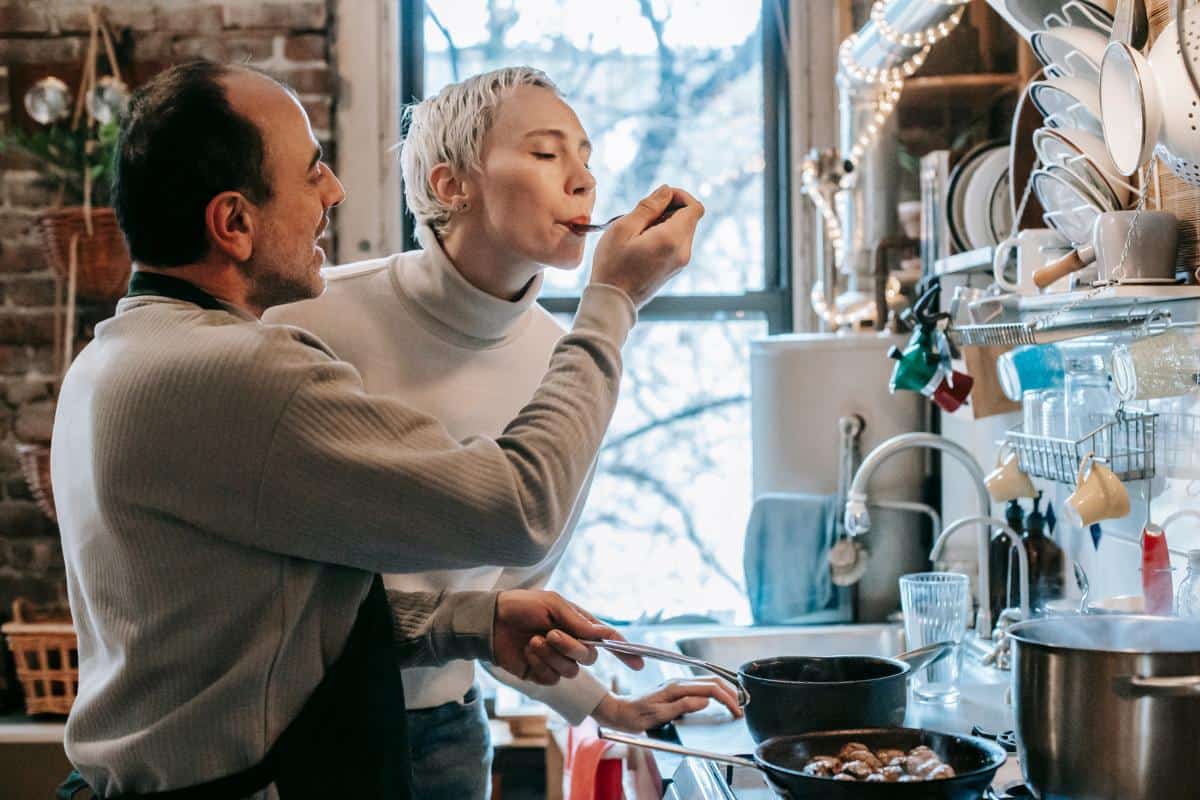This page may contain affiliate links. If you click and buy, we might get a small commission at no cost to you.
In the realm of personal interactions, conveying negative feedback, especially about something as personal as cooking, can be a delicate and tricky affair. Yet, there are moments when it becomes necessary to communicate these culinary critiques. The question then arises – how does one politely tell someone that their cooking is not up to the mark?
How to Politely Tell Someone Their Cooking is Bad
When expressing your thoughts about someone’s cooking, the key factors are diplomacy, tact, and empathy. It’s essential to balance honesty with kindness, and constructive criticism with appreciation.
1. Use “I” Statements

Starting your feedback with “I” instead of “you” can make your comments feel less confrontational. This subtle change in phrasing shifts the focus from the person’s cooking to your personal experience of it, making the feedback easier to accept.
Instead of blaming the person for the cooking, you’re expressing your feelings about it. An example might be, “I find this dish a bit too spicy for my palate,” rather than saying, “You’ve made this too spicy.”
2. Sandwich Your Critique
The ‘sandwich’ method is a popular approach to giving constructive feedback. It involves sandwiching a piece of criticism between two positive statements. This technique can help soften the impact of your critique.
Start by expressing something you appreciated about the meal or the effort, followed by your constructive criticism, and finish with another positive statement.
Here are a few examples:
- “The presentation of this dish is excellent, though I think it could use a touch more seasoning. But overall, I appreciate the effort you’ve put into making this meal.”
- “This is a really creative recipe, but the flavors don’t really work for me. However, I admire your courage in trying something new.”
3. Be Specific
Rather than making a broad generalization about the entire meal, try to pinpoint the specific areas that didn’t meet your expectations. By being specific, you give the person clear, actionable feedback that they can use to improve their cooking. Instead of saying, “I didn’t like the dinner,” you could say, “I found the chicken a bit dry, but the rest of the meal was good.”
4. Offer Solutions
If you’re familiar with cooking, try to offer solutions or suggestions for how they could improve the dish. This transforms your criticism into helpful advice and shows that you’re providing feedback in a supportive manner.
For example, if the dish is too salty, you might say, “I found the soup a little salty. Maybe you could try adding less salt next time, and we can season our own portions if needed.”
5. Show Empathy
Remember that cooking is a skill that takes time and practice to master. It’s important to empathize with the person’s efforts and let them know that it’s normal to make mistakes when cooking. Use phrases such as “I know how challenging it can be to get this dish right” or “Cooking can be tricky sometimes, can’t it?”
6. Praise the Effort

Even if the food wasn’t to your taste, it’s crucial to acknowledge the effort and time they put into cooking. Praise the effort they made, the presentation, or another aspect of the meal that you genuinely enjoyed. This acknowledgment helps to soften the blow of any constructive criticism you offer.
7. Choose the Right Time and Place
Choose an appropriate time and place to voice your criticism. Avoid doing it in front of other guests or family members, as this could cause embarrassment.
Instead, find a quiet, private moment to share your thoughts in a gentle, respectful manner. Your goal should be to help them improve, not to shame or humiliate them.
8. Avoid Comparisons
Avoid comparing their cooking to that of others. Saying things like “This isn’t as good as Sarah’s pasta” can lead to feelings of inadequacy and isn’t helpful. Instead, focus on the dish at hand and how it could be improved.
9. Be Honest but Gentle
While honesty is important, it’s equally essential to convey your thoughts gently. Avoid using harsh words or strong negative language, which could hurt their feelings. Phrase your feedback in a way that is honest but also kind, such as “I think this dish has potential, but it didn’t really hit the mark for me.”
10. Express Your Personal Preference

Frame your critique as a personal preference rather than an objective truth. This approach helps to depersonalize the criticism and softens the blow. Instead of saying, “This dish is undercooked,” you could say, “I tend to prefer my vegetables a bit more cooked.”
11. Remember Your Relationship
The nature of your relationship with the person can help guide how you offer your feedback. It’s generally easier to provide criticism within a close relationship where honesty is valued and understood. However, in more formal settings or with people you don’t know as well, it might be more prudent to hold back or soften your criticism.
12. Be Gracious
Finally, always remember to be a gracious guest. Even if you didn’t enjoy the meal, express gratitude for the invitation and their effort. You can always find something to appreciate, whether it’s the hospitality, the atmosphere, or a particular dish you did enjoy. Remember, kindness goes a long way.
Avoid Sounding Like a Jerk
When providing feedback on someone’s cooking, it’s crucial to strike a balance between offering constructive criticism and maintaining a respectful and considerate approach.
Here are ten examples of statements that might come off as unintentionally unappreciative or passive aggressive towards their efforts.
- “Bless your heart, it’s an interesting flavor combination.”
- “Oh, that’s a creative take on this dish.”
- “You definitely have a unique cooking style.”
- “You’ve sure made this dish your own.”
- “I appreciate the effort you put into this experimental recipe.”
- “I never would have thought to use those ingredients together.”
- “This is definitely an acquired taste.”
- “You’ve certainly put your personal touch on this recipe.”
- “You’re not afraid to take risks in the kitchen, that’s for sure.”
- “I admire your boldness in trying out new flavors.”
To avoid sounding like a jerk, it’s important to choose your words carefully, focus on the positive aspects, and provide constructive feedback in a respectful and empathetic manner. Remember, the goal is to encourage growth and improvement rather than undermining or belittling their efforts.
Encouraging Their Growth
Encouraging someone to improve their cooking skills requires a supportive and motivating approach.
Here are some tips to help you inspire and uplift aspiring cooks:
Provide Constructive Feedback

Offer feedback that is specific, constructive, and actionable. Focus on the areas where they have the potential to improve and provide suggestions for enhancement. By pinpointing specific aspects, you help them understand how to enhance their culinary skills.
Highlight Their Progress
Acknowledge their growth and progress as a cook. Point out the improvements you’ve noticed since they started cooking or compare their recent dishes to their earlier ones. Highlighting their progress can boost their confidence and inspire them to continue developing their skills.
Share Inspiring Success Stories
Share success stories of renowned chefs or home cooks who started from humble beginnings and gradually improved their skills. By sharing these stories, you provide inspiration and demonstrate that culinary excellence is attainable with dedication and practice.
Encourage Experimentation
Encourage them to step out of their comfort zone and explore new recipes, techniques, and ingredients. Inspire them to try different cuisines or challenge themselves with more complex dishes. Emphasize that experimenting is a valuable part of the learning process and can lead to exciting discoveries in the kitchen.
Offer Resources and Recommendations
Suggest cookbooks, online resources, cooking classes, or workshops that align with their interests and goals. Providing them with access to educational materials can help expand their knowledge, refine their techniques, and ignite their passion for cooking.
Share Personal Experiences
Share your own cooking journey, including the challenges you faced and the improvements you made along the way. By sharing your experiences, you create a sense of camaraderie and show that improvement is a continuous process for everyone.
Participate in Cooking Together

Offer to cook together or organize cooking sessions where you can share tips, techniques, and recipes. Collaborative cooking experiences can be fun, educational, and foster a supportive environment for growth.
Celebrate Their Successes
Celebrate their culinary achievements, no matter how small. Acknowledge their efforts, such as mastering a challenging recipe or receiving compliments from others. By celebrating their successes, you provide positive reinforcement and motivation to keep improving.
Show Genuine Appreciation
Continuously express genuine appreciation for their cooking. Highlight the aspects of their dishes that you genuinely enjoy and savor. By showing sincere gratitude, you encourage their passion and create a positive environment for growth.
Remember, encouragement and support are essential when helping someone improve their cooking skills. By providing constructive feedback, sharing resources, and celebrating their progress, you can inspire them to reach new culinary heights.



